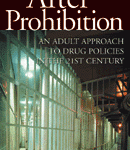Presidents & Nobel Laureates: "End War on Drugs"
The War on Drugs has been a policy failure of enormous magnitude. It has exacted a terrible cost in terms of ruined lives and wasted resources; it has hastened the devastation of the rainforests, eroded our institutions of civil society and weakened the rule of law. It must be ended.
There is a mistaken belief that we can, somehow, “win” the War on Drugs. Yet, if we can’t keep drugs out of even our most secure prisons, there is no sense in turning our largely free society into a huge open prison in the futile pursuit of “victory” in the War on Drugs.
Instead, we need to look at adopting policies that will reduce harm not just to the drug user but also to their families and our wider society. Prohibition of alcohol in America during the 1920s and the early 1930s was tried and found wanting; people continued to drink and turned for their drink to the bootleggers and speakeasies. Prohibition drove the massive expansion of organised crime empires like Al Capone’s, whose infamous exploits have long been immortalised by Hollywood.
Repeal of Prohibition was not a panacea – and could never be. Assuredly, alcohol abuse can and does wreck lives. Drunk-driving and alcoholism wreak a terrible price upon individuals and society, yet the costs of Prohibition had proven to be even higher. Today, the individual costs of the War on Drugs are huge, but the wider societal costs are even greater.
One of the greatest documentaries of the War on Drugs is Adrian Cowell’s The Opium Kings. Filmed over a thirty year span, from 1964-1996, Cowell’s documentary explores the dynamics and politics of the opium trade out of Shan State in Burma and traces the evolution of drug use and supply, as well as the many failed attempts at enforcement and interdiction. Cowell also interviews many of the leading figures involved. Shan State at one time produced something like two-thirds of the world’s opium; and it was opium that was to come to fund the independence efforts of Shan State against the military junta running Burma, the SLORC.
Trailer for Part one of the Opium Kings – the Opium Convoys
Interestingly, the Shan and the opium traders tried to sell their entire crop to the US in 1973 for just $12m (and again in 1977). Yet, rather than trade for 100% of the Shan’s opium crop, the Drug Enforcement Agency chose instead to equip the Burmese military – a strategy so successful that it saw less than 1% of the opium convoys successfully interdicted. Far from stopping the opium convoys, as Cowell discovers, the War on Drugs drove the refinement of opium to morphine to heroin, as these were easier to smuggle – more dangerous drugs which were to inflict a greater toll on users and their families.
But the tide is beginning to turn against the War on Drugs. Launched on November 17th 2011, the Global Initiative for Reform of Drug Policy is an exciting endeavour of the Beckley Foundation. Centre piece is publication of a letter signed by former presidents of the USA, Brazil, Mexico, Columbia, Poland and Switzerland, including Jimmy Carter and Vicente Fox, 12 Nobel Laureates, and various social, scientific and political luminaries declaring the failure of the War on Drugs and calling for radical policy change.
The Global Initiative website has a host of resources, as well as an international petition that can be signed here calling for an end to the War on Drugs.
One of those who signed the letter is Gary Johnson, the former Governor of New Mexico who is seeking the Republican Presidential nomination.
I met Gary Johnson some 12 years ago, when I was interning at the Cato Institute in Washington DC, when Gov. Johnson spoke at Cato’s conference and later collected into a book (edited by Timothy Lynch), After Prohibition: An Adult Approach to Drug Policies in the 21st Century; Gov. Johnson’s contribution can be found on pages 13-20.
Gov. Johnson discusses his views on drugs (and alcohol) in a campaign video:
Whilst his securing the nomination is something of a long-shot, making advocacy of legalisation a central part of his candidacy for the Republican nomination is refreshingly exciting, and is helping to bring debate over drug policy into the mainstream. For Gov. Johnson, the key to the debate is what policy reduces individual and social harm: “this is a health issue not a criminal justice issue”; legalized drugs won’t be a panacea but there will be less harm than under the current regime of drug prohibition.
